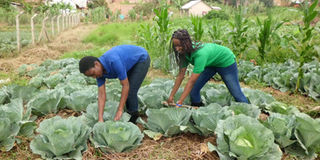Students get agriculture lessons for better career

Students attend to their cabbage during the Gayaza High School farm camp on Monday. Photo by Lominda Afedraru.
What you need to know:
Besides the inspiration from the hands-on experience during the week-long camp, it exposes students to careers in agriculture, agribusiness, entrepreneurship, innovations and leadership skills through agricultural activities, writes Lominda Afedraru.
As their colleagues were enjoying holidays at home, more than 600 students drawn from different colleges and high schools gathered early this week at Gayaza High School on the farm.
Some were seen watering vegetables, others checking on nursery beds, while the rest were on fodder farm attending to dairy animals.
Every year there is a farm camp organised for secondary school children across the country at Gayaza High School in a bid to impart innovative agriculture skills in the children.
This year’s camp which ended on Thursday attracted students from schools such as St Peter’s College Tororo, Marry Hill, Nyakasura, and Our Lady of Good Council among others.
Under the theme “Youth in agriculture” students explored the opportunities in the farming value chain with sponsorship from Association of Volunteers in International Service (AVSI) under the Sky project which is supporting in skilling them in agriculture innovations across the country.
Great outing
The head teacher of Gayaza High School, Victoria Kisarale, thanked experts and facilitators for impacting practical sessions.
According to Kisarale, besides gaining knowledge on farming, the programme opens learner’s minds enabling them to become innovative enough to tackle challenges such as food security, environmental degradation, market exploitation and poverty reduction.
Students learned various skills in poultry keeping, piggery, dairy farming, vegetable growing especially in greenhouses and how to add value to agriculture produce.
“It is widely recognised that entrepreneurship is a major drive of innovation, competitiveness and growth. The role of schools in fostering entrepreneurial mind set among school going youth is to instill innovative farming culture in them and this can lower the level of unemployment among the youth of this country,” said Kisarale, adding that through this programme students are exposed to agricultural activities early enough so that they can identify more career opportunities in the agricultural sector.
Students speak out
Simon Peter Okalang, 14, aspires to be a veterinary officer. He said he would use his professional skills to inspire farmers in Tororo District to embrace modern dairy farming methods, including use of artificial insemination to improve breeds.
Farming in primary schools
Dr Brian Kyagulanyi, the sales and technical manager at Biyinzika Farm Ltd, who are sponsors of the farm camp, notes that his team has embarked on skilling students in both primary and secondary schools in innovative agriculture practices.
This is the first time they are engaging secondary schools but they have been engaged in model farming scheme with 18 government aided primary schools in Nakawa Division where they offer them 200 broiler chicks and 300 kilogrammes of pelleted feed.
The team sensitises the pupils and teachers about best practices of breeding poultry for meat and eggs.
Each school is given 200 chicks twice but in the second set of offer the school takes the responsibility of buying the feed.
This has worked well for pupils, teachers and parents.
Most pupils from these schools encouraged their parents to engage in poultry keeping. Parents from Police Children’s school in Naguru have taken on this initiative.




